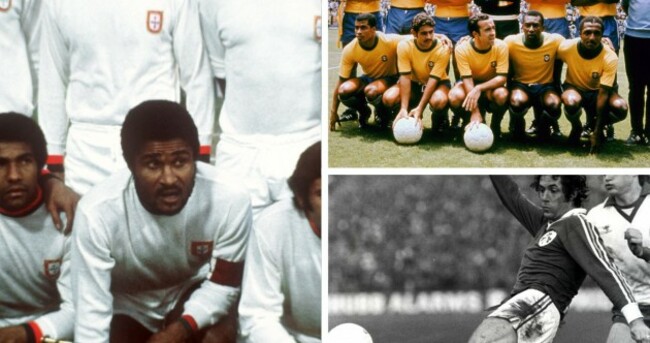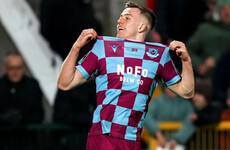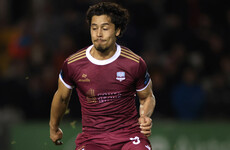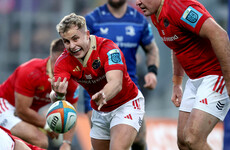IRELAND, BRAZIL, AND the ‘Minicopa’ of 1972. The story of the first Ireland team to play in an international tournament has not been forgotten over time – it was never really told in the first place.
Pictures of the Irish team’s involvement are practically non-existent. The only available footage boils down to some grainy footage lurking in the backwaters of YouTube. No Irish media travelled to the tournament. There were certainly no supporters on the plane. It remains one of the greyest areas in the often grey and unusual history of Irish football.
But Ireland were there, and their three-week trip to take part in the Brazil Independence Cup turned out to be an important chapter in the development of Liam Tuohy’s young, talented team.
Before all that, a little background.
In the early 1970s, the Irish football team were not in a particularly good place.
A series of tough draws in both the World Cup and European Championship qualifiers made it hard for Ireland to even poke their head above water.
A few thousand miles away, Brazil were cementing their status as what many still consider to be the best team to ever play the game. Pelé and Co had just won the 1970 World Cup in Mexico, and had designs on hosting the ’74 edition as the Brazilian Government started building brand-new stadia all across the country. FIFA weren’t too enthused with the idea of back-to-back World Cups on the American continent. João Havelange, President of the Brazilian Football Confederation, was not impressed. Realising the World Cup would not be coming to Brazil, Havelange decided to take matters into his own hands and went to the Brazilian Government with an idea.
The Brazil Independence Cup, or the ‘Minicopa’, as it came to be more widely know, would be held across June and July in 15 different venues in Brazil, and would celebrate the 150th anniversary of the Brazilian Declaration of Independence.
Criteria for the Minicopa was simple; get the best teams possible over to Brazil for a showcase tournament which, ideally, the hosts would win.
Ireland were not exactly box-office, and were not top of anybody’s wantlist.
Yet getting European teams to come over for this strange, one-off competition was proving difficult. Celtic manager Jock Stein was said to be livid at the idea of his players joining the Scotland squad for what many felt was a Brazilian vanity project. Real Madrid held similar reservations. The shortlist was narrowed further due to that summer’s European Championship finals in Belgium, which hosted just four teams. Many of the teams who failed to reach those finals were more interested in saving money and giving their players some time off.
It was even a hard sell to some in Brazil, and there were reports Pelé turned down Havelange’s request to come out of international retirement for the Minicopa.
At one stage, it was reported that Minicopa organisers had entered talks to bring over a ‘UK XI’, which would consist of select England players and other star names such as George Best. This failed to materialise, and after much deliberation, an invitation was extended to Ireland.
Calls were made, bags were packed, and Ireland were off to take part in their first international tournament, joining 17 other national sides, including France and Argentina, along with two representative teams from Africa and CONCACAF.
It was all a bit rushed.
“I remember walking with my two-year-old daughter and turning the corner home in Artane, and Liam Tuohy was sitting on the wall of my house,” recalls Turlough O’Connor, who was 25 at the time and would shortly leave Dundalk for a second stint at Bohemians.
“He told me somebody had cried off injured and and asked if I would be available on short notice to travel to Brazil. Now, how many chances do you get to represent your country? There was no way I wasn’t going.”
Tuohy assembled a young squad which was a mix of part-time League of Ireland players and full-time professionals playing in the English First Division. Yet few had experienced anything like what the next weeks would hold in store.
Mick Leech was 23, playing his club football with Shamrock Rovers, and massively excited at the prospect of this exotic trip.
“It was everybody’s ambition to play in Brazil,” he says.
“It was the home of football. Especially after the 1970 World Cup. The Brazilian team that won that World Cup was probably the best team I ever saw play. Brazil had a magic about it.
“We flew from Lisbon out to Recife, and to this day I’ll never forget the experience of walking off that plane. It was three or four in the morning, but the heat was just unbelievable.”
Ireland were based in the north of the country, splitting their time between the coastal cities of Recife and Natal, which kiss the Atlantic Ocean along the most easterly point of Brazil.
Setting up camp a full week before the tournament kicked-off, there was plenty of time for the squad to get out and explore their new surroundings.
“The facilities were tremendous,” says Leech.
“Football was huge in Brazil and teams going out were treated like superstars. You had freedom, but you couldn’t really go out walking or whatever without being followed by security all the time. I mean most of the other teams were confined to the hotels in their tracksuits, which was their only gear. Some of them used to ask us to bring them back bottles of whiskey, because that was the only way they could have a drink.”
“There was a local priest there, he was an Irish priest working out in Recife, so most of the squad went out to Mass one of the days,” adds O’Connor. “It was just us and some of the locals.
“But the poverty in the place… Even Ireland in 1972 wasn’t a rich country as such, but after going to Brazil and looking at the value of what we had here compared to Recife and Natal, I tell you, it taught you a lot about what you had.”
Pitted in a group alongside Iran, Ecuador, Chile and Portugal, Ireland headed into the group stage with genuine ambitions of causing an upset and reaching the knock-outs.
“In no way was it taken as fun,” Leech says. “We certainly went out with expectations. We felt we could compete very well and that was the attitude.”
Yet for all the top-class facilities that had met Ireland in Brazil, things quickly turned farcical when they arrived to take on Iran in their first group game. Shortly before kick-off, Ireland asked for the playing of the national anthems to be shelved when it emerged the band had only been provided sheet music for God Save the Queen.
“They thought we were a complete representative Ireland side, with players from 32 counties rather than 26!” says O’Connor.
Having already lost their anthem, Ireland then lost the support of the stadium. Knowing next to nothing about each other, both teams had only packed their home kits, leading to a green-on-green kit clash. Ireland were asked to source an alternative.
“Liam stood his ground and said ‘No way. We’re after coming this distance, we’re not changing our kit!” O’Connor laughs.
Iran improvised by lining out in the kit of local side Santa Cruz, which quickly enamoured them to an otherwise bemused Brazilian crowd.
It was a surreal experience for Tuohy’s team in the newly built Estádio do Arruda, which had only opened earlier that month.
“The stadium was a 60,000 seater,” says Leech.
“When we got there and actually saw it, ah, it was unreal. They had the dyke around the track and when you saw the distance to the stand, you’d say how were people ever going to the matches? If you compared it to Dalymount for us, where the crowd were right on top of you, the crowd in Recife were about 100 yards away from you!”
After falling 1-0 down inside the opening 10 minutes, Ireland fought back with second-half goals from Leech and Don Givens.
It was a particularly special moment for Leech.
“Ah, you’d always remember your first goal for your country,” he says. “I remember picking up the ball in the middle of the field, I played it to Noel ‘Gussy’ Campbell and made the run through. Gussy was a great passer of the ball and he was able to chip a ball through the middle of the defence, and I took it on the chest and knocked it over the goalkeeper.”
The result represented much more than two points on the board. It was Ireland’s first competitive win in over four years, an unwanted run which has stretched to 19 games.
Yet Leech says confidence had never been an issue within the squad.
“People point out that we hadn’t won a game for however many years, but when you look at the quality of the teams we were playing…
“I played in the 1970 World Cup Qualifiers. Like, we were drawn with Czechoslovakia, Hungary, and Denmark, and only one team was qualifying. Like, you’re talking about [quality] teams. There was no Gibraltar. When you look at the teams in the groups now…”
The Iran game had only been Tuohy’s second official match in charge, having succeeded Mick Meagan in October 1971. The squad were enjoying life under their new boss in the South American sun.
“I think what made Liam such a great manager was that he got on with players and he had a great football sense, a great football brain,” O’Connor says.
“He was a manager you learned from, because of his ability to get on with his players. The way he treated players, his own personality, he was able to be ‘one of the boys’ as well as the manager. He had that gift.”
The win over Iran meant Ireland were up and running, but there wasn’t much time for celebration.
“It was difficult having a night out over there because with the heat and the distances we were travelling, you were dehydrated after most games,” Leech explains.
“Although the hardest part, I found, was that the grass was totally different to the grass we played on over here. It was like tough grass… You could barely run through it. That took more of a toll out of me than the actual heat.”
The next hurdle was Ecuador in Natal’s Estádio Machadão, another new build.
“Ecuador were a very, very physical team. They kicked lumps out of you,” says Leech.
“They were big, they were strong. But the South American teams, they had that touch, that quality,” adds O’Connor.
“Even the big fellas had a good touch. They showed a lot of ability on the ball. Whereas even the European teams at the time were the longer ball type of thing. But they liked to get on it and play.”
Eamonn Rogers handed Ireland the lead inside the opening few minutes, but Ecuador pulled level by half-time.
In the second half, 20-year-old Bohemians midfielder Mick Martin put Ireland 2-1 up.
“Goalkeeper had no chance,” Martin says.
“I was between the penalty area and the 18-yard box. When the ball came to me, I knew I wasn’t really under any pressure from anybody, but I hit it fairly quickly and it flew in.”
Ecuador equalised again before O’Connor struck a late winner.
“I’ll always remember it, because just before, Alan Kelly kicked the ball out and I was off like a shot, but I was blown offside,” O’Connor explains.
“Within five minutes of that, Alan gets the ball again and I knew he was going to kick it long. I was very conscious of the fact they were going to play offside, so I made sure I was onside. Alan kicked it, they stepped up a bit more, the ball just took the one hop, and the keeper had come out and I was able to lob him. It was a nice one to get.”
Ireland were two from two, and determined to secure qualification for the finals of the Minicopa, which meant a dream trip to Rio de Janeiro and a chance to play in the mythical Maracanã.
“Individually we had some very good players,” says Leech.
“Alan Kelly was a top class goalkeeper. John Dempsey, Joe Kinnear, Paddy Mulligan, Tommy Carroll at left-full. Midfield we had Don Givens, Ray Treacy, they were all fellas playing in what is now the Premiership. The quality of the team was quite good.”
Against Chile in Recife, the dream took a major hit.
“Even this far on, I’m not just saying it, some of the refereeing decisions that day…” says O’Connor, the pain still clear in his voice.
“We should have had about three or four dead-cert penalties. I was chopped down for one of them. I just couldn’t believe it. I tapped the referee on the shoulder to kind of say ‘Look, what’s the story here,’ and he turned around straight away and couldn’t wait to send me off!
“The only time in my whole career I was ever sent-off. That Chile match was total robbery.”
A 2-1 defeat left Ireland with a mountain to climb.
They still had a mathematical chance of reaching the knock-out stages, but to do so, they would need to beat a star-studded Portugal team by a considerable margin in Recife.
“We felt we had a chance against Portugal and we played exceptionally well,” says O’Connor, who was suspended for the game.
The team knew the game represented a chance to prove themselves against a genuine world-class side.
“Without anybody knowing, about an hour and a half before the game Liam came up to me and said ‘By the way, your job is to man-mark Eusébio today,’” says Martin.
“Eusébio was a world star at the time, a Portuguese legend. I said to Liam ‘Yeah, it’ll be no problem to do that.’ I knew I could handle it pretty well. I was just about to turn 21, Eusébio was 30. If it came to pace and running around, I’d tie him up all right. But he was a cute player. I went everywhere he went, and he didn’t get an awful lot out of it.
“I had seen him play for Benfica against Manchester United in the 1968 European Cup final, and also for Portugal when the World Cup was in England [1966]. I remember watching him closely then, and he was just something else. It was an honour to be asked to mark him, but I knew it wouldn’t be difficult for me.”
Portugal also used the game to try out some new faces, with substitute goalkeeper Felix Mourinho coming on for the final five minutes to win his one and only international cap. His nine-year-old son, José, would go on to make a much more lasting impression in football.
Despite a spirited performance Ireland lost 2-1, their goal coming courtesy of Leech.
“A ball at the near post, I got on it. They beat us 2-1, but we had them at 1-1 for a while and the game could have gone any way.”
The dream was over, and Ireland were heading home after finishing third in Group B. Some took the exit harder than others.
“I would have loved to stay on and go down to Rio and play in the Maracanã,” says Leech.
“That would have been just the total… Like, the Maracanã at that time, you read all the stories about crowds of 140,000, and you’d see the odd game on TV and think this was some miracle stadium, you know? But I understood the lads at the English clubs who had already had a hard season. They wanted to go home and have a break, they were probably back in pre-season three of four weeks later.
“I would have stayed out there forever to be honest with you, but sure that’s it.”
An 89th-minute goal from Jairzinho saw the hosts beat Portugal in front of a crowd of 100,000 in the final, and despite being a financial failure, the tournament was considered a success for Havelange. He was named FIFA president two years later.
For Ireland, there was no fanfare upon their arrival home. But the value it gave to that Irish team was clear, as they returned with a renewed sense of confidence, and, crucially, a renewed sense of unity.
“The lads that we had out there did themselves proud, and we loved it,” says Martin.
“When you played internationals, you were gone two days before and home the day after,” O’Connor explains. “With Brazil, it was three weeks living and eating with the same guys. It was a great opportunity to get to know them. Breakfast, dinner, tea and training together, there was great bonding in the squad. There was good crowds and great excitement. They just love their football in Brazil, [especially] at that time. It was a marvellous experience.”
Just a few months later, Ireland would record a famous 2-1 win over France at Dalymount Park, their first home win in six years.
“Prior to that tournament, Ireland hadn’t been winning games,” says Martin.
“It was great to go back home with a bit of confidence, and shortly after we came back I was transferred across to Manchester United, which was a big, big thing for me at the time.”
The trip was also a productive one for the FAI.
“I assumed the FAI had good contacts in South America, because I spent a lot of time down there playing international football,” says Martin. “Their contacts were good and they were always going to be invited when things like that [Minicopa] came up.”
The following year, Brazil would rock up at Lansdowne Road to take on an all-island Ireland team, billed as Shamrock Rovers XI. Some of that Ireland Minicopa squad would get back to Brazil to play what was essentially the return fixture in the Maracanã in 1974, but for others the dream never materialised.
But looking back after almost 50 years, even those involved remember the Minicopa as a strange chapter in the story of Irish football.
“Even over here in the papers at the time, no reporters went out,” Leech points out.
‘There was a squad of not even 20 players, Liam Tuohy, Dr O’Driscoll and Peter Fox, who was the trainer, masseur and bagman, and Louis Kilcoyne. That was the total group, 23 or 24 people. No newspaper reporters, no nothing.
“It was a time in Irish football that was kind of forgotten about.”
The42 is on Instagram! Tap the button below on your phone to follow us!
















Don’t buy the women’s jersey if you don’t like f€€king thing. This is the stupidest thing I have heard in a long time
Why anyone in Ireland would buy a ManU jersey is the most puzzling part of the equation for me.
My missus loves it. Madrid, Munich, Chelsea, Germany all have the exact same women’s Jersey design by Adidas last year and there wasn’t a problem
That’s what I was thinking, because I was looking on Adidas for the new Juventus jersey and it had duplicates of those jerseys everywhere
Well they’re designed for the shape of women’s bodies which women find okay but a lot of the argument is that it’s not a replica jersey really since it has a different neckline. They’re even selling it as part of their “lifestyle” range. It’s missing the black&red stripes which is part of the design influence.
This seasons Chelsea kit for women is a replica kit which is designed for a woman’s shape and doesn’t have the different neckline. Granted they actually have a women’s team too so that’s probably why they’re selling the replica women’s shirt.
Sure women don’t mind a revealing neckline when it’s bought from any of the designer fashion companies, but when what appears to be a male dominated football company releases one its suddenly sexist?
It’s really going to show off Wayne Rooney’s cleavage
Why are Adidas even releasing a statement to appease absolute morons who get offended by the shape of a cloud in the sky.
Please stop getting your information from goal.com
at least they’re giving credit
These jerseys are commonplace at latter stages of gaa championship in Croker
Were cleavage lovers polled about this shirt? I suspect they won’t be buying it – you’d see more cleavage in granny’s wooly vest.
Ehh, do women want people to admire their chests? Or are they wearing revealing clothing for temperature regulation?
I showed the jersey to my girlfriend (yes, I have a girlfriend, trust me, I’m more surprised than you are) and she said she actually liked it. She didnt have any problems with the neckline at all.
You should write to nike and tell them your missus sorted the whole thing.
It’s Adidas smart-ass!
Or adidas
You must have at least one solid color designer t-shirt in your clothes. This is the shirt that can go with jeans, pants and everything in between. long sleeved shirts